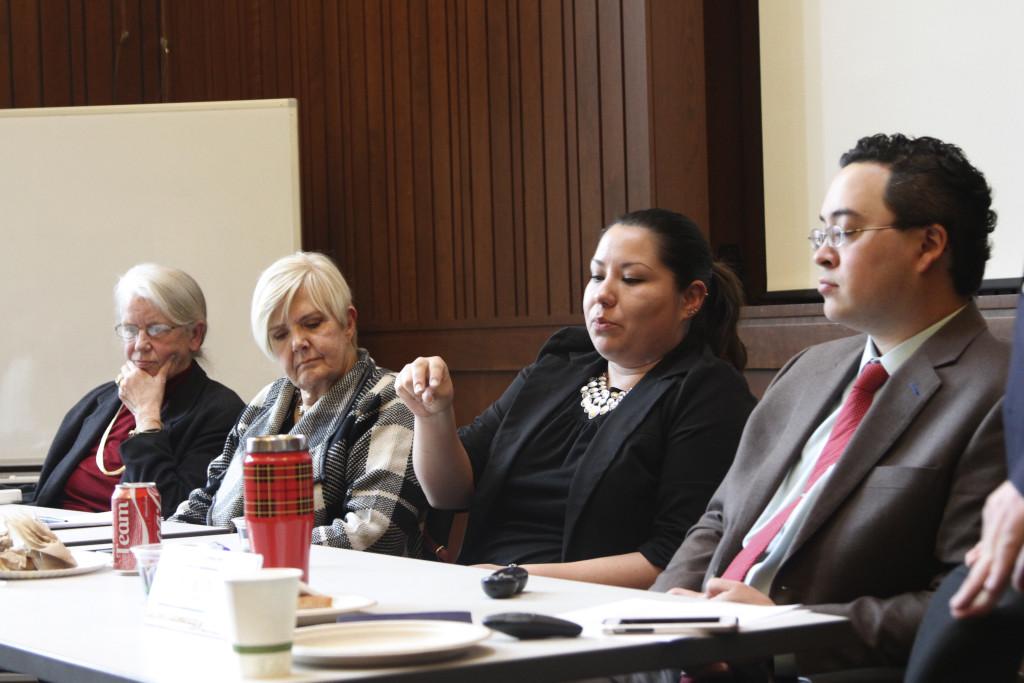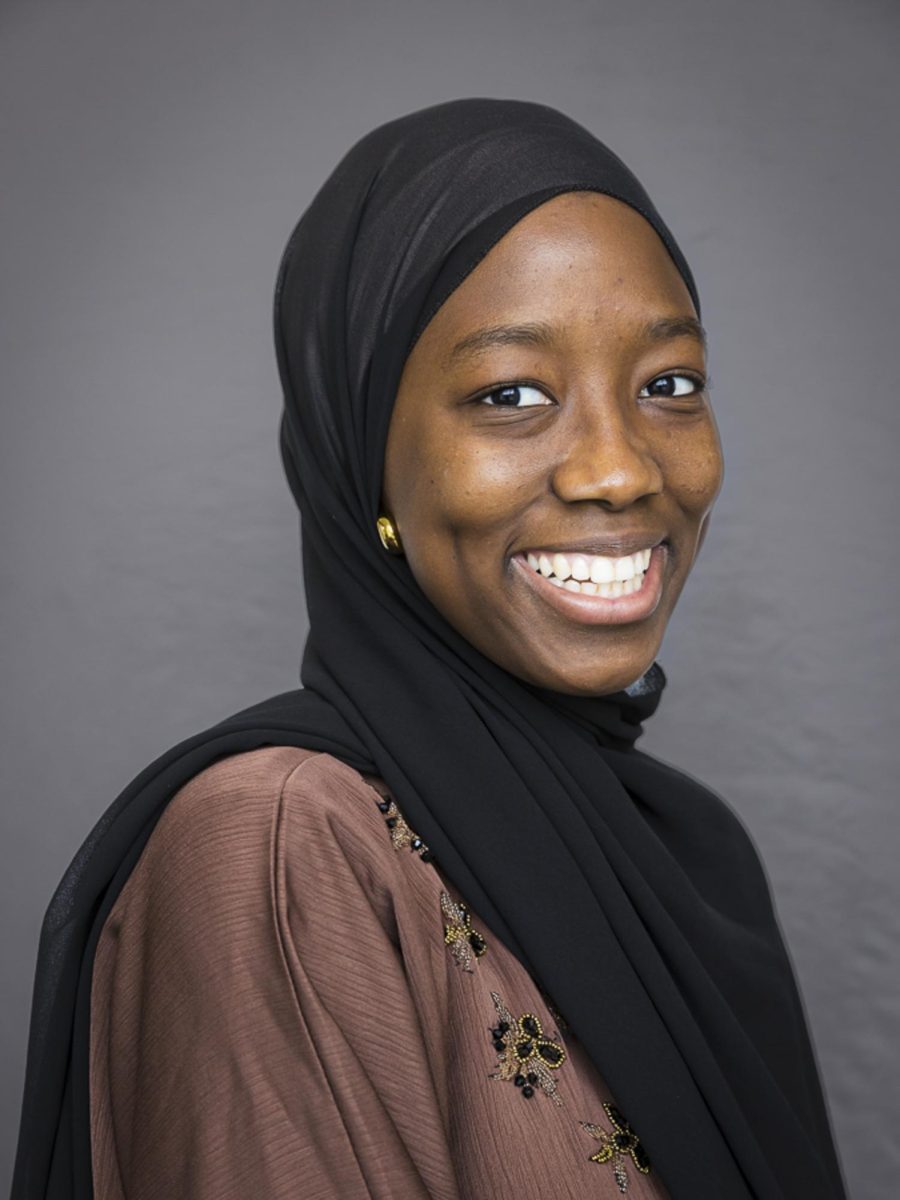This month’s Global Citizenship in the News event, hosted by the Institute for Global Citizenship, was in the form of a panel and focused on the functions of a caucus and how it represents or fails to represent certain groups of voters. The members of the panel included Philip Chen, Visiting Assistant Professor of Political Science; Liz de la Torre, community member; Vicki Wright, Director of Training and Party Affairs for the Minnesota Democratic Farmer Labor party; and Janet Beihoffer, a Minnesotan Committeewoman for the Republican National Convention. At the end of the event, questions were solicited from the audience.
The event consisted of a discussion with a brief overview of the history of caucuses followed by short speeches by three panelists who described their position in the caucus system. Acknowledging that each state has a slightly different process for a caucus, the panel focused on Minnesota’s process.
Chen kicked off the panel by giving a lecture on the decades-long history of the caucus in only five minutes. Starting with how party leaders used to choose the nominees for general elections, he took the audience through the history of how voters from the Democratic party, primarily, demanded greater participation in political processes in 1968 which led to the caucus system. The current system allows voters to elect delegates who choose nominees at the national convention.
To win a party’s nomination, a nominee needs to receive a majority of the delegates, or 50 percent of delegates plus one more delegate.
The two different methods of electing delegates are the caucus and the primary. Primaries are essentially mini, statewide elections. Caucuses, as Chen explained, are more nuanced. The most basic definition is that they are a group of people from the same precinct or neighborhood who meet to discuss the candidates and cast their votes.
Chen concluded his portion of the panel by saying that the delegate system is “not necessarily representative of the general population, and isn’t even necessarily representative of the general electorate.”
Further explaining the function of a caucus, Wright said “[The caucus] really creates a face-to-face democracy,” she said.
To explain the process in different terms, she said “it’s like taking a poll or a survey, and that’s a different thing than an election.”
Following Chen’s overview, de la Torre spoke about her experiences attending caucuses in Minnesota.
She expressed frustration at the representation aspect of caucuses.
“As I’ve gotten more and more into it, I’ve seen that there are many ways to improve the process,” she said.
De la Torre noted that far too often candidates secure voters in a community and then there’s no engagement after that. Candidates move on to other districts once they are certain they have guaranteed enough votes.
The panelist also discussed how issues of lower socioeconomic status may become relevant with a caucus. They explained that there can be questions of caucus accessibility, voters knowing where a caucus is and feeling empowered to involve themselves in the caucus, among other issues.
Typically it is people who have the time to invest who participate, representing a much more gentrified population than the general electorate.
“You just kind of have to learn [the rules] and play by [them],” de la Torre concluded.
Wright stressed the effect of grassroots movements in Minnesota politics and the accessibility of politics to the average voter, supplying the anecdote of [whatever position she held in the DFL office].
“I was stuffing envelopes and the Congressman walked in, and my jaw dropped,” she said.
She painted the caucus in a more positive light than de la Torre, talking about the power of the communal aspect of the caucus.
“[The caucus] really creates a face-to-face democracy,” she said.
To explain the process in different terms, she said “it’s like taking a poll or a survey, and that’s a different thing than an election.”
Lastly, Beihoffer spoke about her opinion of the caucus.
Beihoffer focused on the stereotypes of caucus participants that say they are the extremes of both ends of the spectrum. “The participants do have strong opinions because they care,” she said.
Stressing the importance of local participation, she urged students to take advantage of their ability to voice their opinions in a caucus.
“This is what we were founded on, local control and local interest. If you default to [Washington,] D.C., for one size fits all, it won’t work because we are all different,” she said.
After Beihoffer finished, there was time allotted for questions.
As the question and discussion portion of the panel started, the members of the panel all seemed to agree with the premise that caucuses are a flawed democratic system, but one with inherent benefits.
One student asked the panel to discuss the tangible benefits of the caucus system compared to a primary system.
“There’s going to be a lot of debate as to whether a preferential ballot is better than a caucus. And to be honest with you, I don’t think it is,” Wright said.
On the other side of that question, de la Torre answered, “When people are struggling, I don’t understand how you’re supposed to attend. I think it’s exclusive, I think it’s an insider game,” pointing out the accessibility aspect of caucuses that primaries overcome with measures like absentee voting.
The other major theme of the questions was how students can overcome the age bias present in caucuses, or the situation that arises when party leaders are from an older generation and distrust the motives of younger voters.
This topic particularly resonated with the audience, and many students were nodding their heads in agreement as it was raised.
Beihoffer said that bias against youth voters is an “attitude [that] is top-down.”
She urged students to seek committee positions within the caucus to make themselves more prominent. To overcome the thought from the “old-guard” people in authority for both parties that college students are just temporary community members, Beihoffer recommended that students better involve themselves in the electoral process.
“I hope that [the students] walked away asking questions about how caucuses actually affect citizens. I hope [the students] question how they can get involved, the limits of that involvement, and perhaps what that might mean about our system in Minnesota generally,” explained event coordinator Will Theriac.














Blake Wilkins • Sep 11, 2019 at 11:29 pm
I am continually searching online for articles that can benefit me. Thank you!
Paul Berry • Sep 10, 2019 at 5:02 pm
Thanks for another informative web site. Where else could I get that kind of info written in such a perfect way? I’ve a project that I’m just now working on, and I’ve been on the look out for such information.
Trevor Howard • Sep 9, 2019 at 12:09 am
What i do not understood is in truth how you’re not really a lot more well-favored than you may be right now. You are so intelligent. You know thus considerably in the case of this subject, produced me in my opinion imagine it from numerous varied angles. Its like men and women are not fascinated unless it is something to do with Girl gaga! Your individual stuffs great. At all times deal with it up!